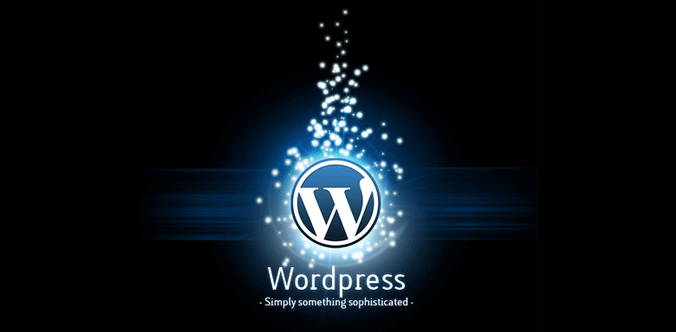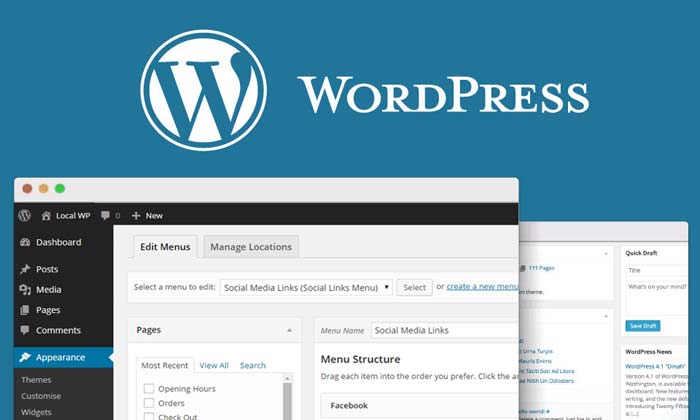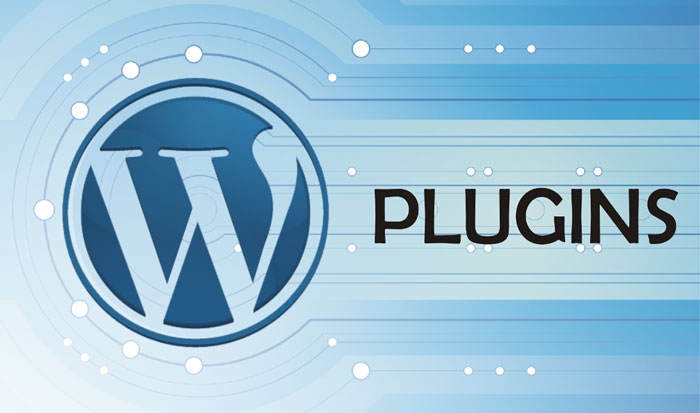Tags: CMS, WordPress
Why WordPress is Better than a Website

Even though WordPress did not get much recognition when it first came out several years ago, it quickly blossomed into a critical online platform that has given the humble website a run for its money. The following are some of the main reasons it’s gaining rapid popularity with bloggers and especially in eCommerce.
Affordable and Easy to Use
If this is your first time starting a business, online or off, then money must be tight. However, since today’s consumers are typically dependent on online reviews and eCommerce websites, it’s always a good idea to take your brand online. But rather than hiring a web designer to maintain and create a website, you can just maintain a WordPress account and place all the information for your products and services there.
For successful blogging your blogging platform is very user friendly, so you can add more pages on your own as well, without downloading additional software. This way you can save money and use it to make your business more profitable. Of course, once it takes off, it would be a good idea to hire someone experienced in WordPress to manage your account for you.
Time Management Capabilities
Even if you are a great writer, your blog will hold no water if it’s not updated on a regular basis. This won’t be a problem if you host it on WordPress though. All you have to do is add the content you want and just schedule the posts according to the time and dates you want them to be published.
How to get recognized on the Web using WordPress

Make your mark on the World Wide Web with WordPress
For those who are unaware, WordPress is a CMS or Content Management System that is a good alternative to a fully functioning website. As a website’s content grows, so do challenges on how to represent it to target readers. However with a content management system such as WordPress, you can manage as many pages as you need with the range of options it has to offer.
Attract search engines
Straight out of the box, the content management system comes ready to cater to search engines. Besides guiding them through pages, posts and categories, it can help them collect the information they need to propel your site to the top of search engine results.
Of course, that would not be possible without utilizing the in-built digital marketing tools the CMS comes with. This includes htaccess which can be used to create static URLs called pinging and permalinks to name a few. This is a configuration file that can be used to change a server’s settings for the directory it is based in. Permalinks are used by other bloggers who wish to connect with your blog and you can also use it to link a blog to an email. However, you should not change the URL of the posts if you want this to work. Since WordPress allows users to create permalinks with keywords search engines prefer, creating them will be worth your while. Read more about WordPress SSL
Setting Up Your First WordPress Website

Creating your own website can be an extremely rewarding process. However, it can also be somewhat difficult if you don’t really know what you are doing. WordPress is the most popular option for beginners to set up their first website. In this article we will look at the two types of WordPress websites you can set up, along with how you should go about setting them up.
WordPress.com
If you want to set up a simple blog or informational website, WordPress.com is almost definitely your best option. It is free, extremely easy to set up, and very simple to use. This platform offers everything from free hosting to a free domain name (within reason).
However, there are a few cons when it comes to using WordPress.com over WordPress.org. These include having .wordpress.com attached to the end of your domain name, a difficulty in monetising your site, and a significantly reduced customizability compared to open source website building platforms. Setting up a WordPress.com website can be done in just a couple of steps:
- Head over to WordPress.com and create an account. During the account creation process you will be asked to create a domain name and website name.
- Once you have your domain and website address, you are ready to start installing WordPress plugins and building your site!
- Although limited, WordPress.com does offer a few different ways of customizing your blog, including using different themes and colour schemes. Choose one which suits the image you are trying to create.
- Start creating content, learn some WordPress SEO techniques and encourage people to visit your site!
Yes, it actually is this easy to start designing a website with WordPress.com. This is great for people like hobby bloggers or parents looking to document their family lives.
WordPress Websites: The Latest and Best Solutions for SEOs

WordPress is an online, open source site creation instrument written in PHP. Web designers, free-lancers and at-home-tinkerers all love it which is the reason it is the most popular CMS in the World today. However, in the non-nerd talk, it’s likely the simplest and most effective blogging and site Content Management System (CMS) in presence today.
The Benefits of Using WordPress
The Programming is Free
How often have you been given something for free that is completely utilitarian and ready to use? With this free Content Management System (CMS), if you need to upscale your website a little more with premium topics or new modules, you will save a great deal over what you would have paid for a professionally made website.
WordPress has a Web Search Tool (SEO) Points of Interest
Web search engines love websites that are easy to list like WordPress is says the guys at SEO Sydney Pro, and that have regularly overhauled content. That is where blogging comes into play. Just by maintaining your business or individual site and writing your blogs in a way that is characteristic of you, you’ll be delivering the kind of crisp, applicable content the search engines will love. You need visitors to discover your site, so you have to ensure it can be found.
The best way to do that is to concentrate on SEO. SEO is the procedure of making the kind of changes and adding conformity to your site that search engines like so they’ll rank your website higher.
Appearing higher in indexed lists means more visitors will discover your site. There are some basic methodologies that can help your SEO. Having more substance gives web crawlers more items to rank, which in turn helps a prospective client to find your website. It also implies you have more important substance in your information so individuals will find the information they are looking for and become customers. Utilizing WordPress is a great approach to enhance your SEO more easily
Up the Ante on your Blogs with WordPress Plug-ins

Even if you consider yourself a WordPress guru, you will only go so far unless you install appropriate WordPress plug-ins to fulfill all of your needs. The following are some that are preferred by the CMS community, but whatever you do, don’t try and install all of them. Pick those that seem relevant if you don’t want your website to slow down.
W3 Total Cache
WordPress can be great if you have a lot of content to share, but it can get slow fast if it is not managed with plug-ins or is hit with loads of traffic every day. For instance, once your website hits 500 page views, you will need to start caching them. That way they won’t need to be re-generated each time. You can do that easily with W3 Total Cache. The plug-in is affectionately known as The Swiss Army knife of performance plug-ins since it can manage almost everything from delivery to miniaturization.
CloudFlare
If you are looking for a solution that can fix loading speeds, then you should download CloudFlare. This is a free to use plug-in that can act as a replacement for your current DNS, work as a firewall against malicious requests and can even cache content. Since you will need to modify your domain for it, you may face a little difficulty during installation. However, it will be smooth sailing once you do.
How to Choose between CMS platforms

Choosing a content management system (CMS) that can fulfill all of your requirements can be a challenging endeavor. Without clear cut requirements, you might be tempted to download the first one that has the fanciest features! The following analysis will help you narrow down your choices to pick an appropriate one:
Check Functionality
Now when most people are looking for a CMS, they look for one that can help them edit, organize, create and manage content on their websites. This is an incorrect assumption since not all content management systems are capable of all of those features. For instance, not every blogging platform allows users to manage pages in a hierarchy. Some even go so far as to post blogs at random or according to date. This may be ideal in certain circumstances, but this limitation can be quite frustrating if you wish to say, post a large DIY tutorial in one go.
Your job is to first ascertain what you need from your CMS along with the basic features you need to make changes if necessary. Be wary of those that do not allow you to accomplish core tasks such as structuring and organizing pages. There are literally thousands of such open source software out there and you will need to test a couple out before sticking to one.
5 Benefits of Using Open Source Software

As more and more businesses and government entities opt for open source software such as Linux, it’s clear that the platforms have more to offer than meets the eye. Perhaps its definition can best be explained if we take a look at the benefits it offers.
Flexibility
As the name implies, open source software is open to all, meaning that its code can be accessed by anyone who wants to make changes in it. In other words, no single company owns it and any business can create their own software without facing copyright issues. It is easy to manage as well and can be outsourced to multiple vendors thus eliminating entry and exit barriers. Plus, you can always choose another vendor if the one you chose does not pan out.
Quick Deployment
Consumers can launch new software solutions in days rather than the years it used to take before. Software that is created using it can be tested prior to deployment and is quite beneficial when it comes to collaborations between two entities and experimentation. Additionally, developers can anticipate the needs of existing and potential users with the results they receive from the number of tests that they will be able to do.
Understanding WordPress

If you have a blog, the best thing to do is to maximize its readership through a CMS such as WordPress. Over the years, the portal has evolved into a state of the art blogging platform that can be used to create, edit and publish highly customizable content in real time.
If you have used WordPress even once then you know that in order to access your account all you have to do is log into your administrator dashboard using ‘your-site/wp-login.php. You can easily upload new content, modify old blogs or publish new, install plug-ins, themes etc. However, have you ever thought how you can maximize its potential?
The ultimate aim of the CMS is to generate HTML pages on a dynamic basis which is why an HTML page and web page are considered synonymous with each other. WordPress uses SQL and PHP to store data and the PHP code makes up the core for the CMS while the database makes up its memory. Each installation of WordPress gets its own database and the following information you enter is stored there: